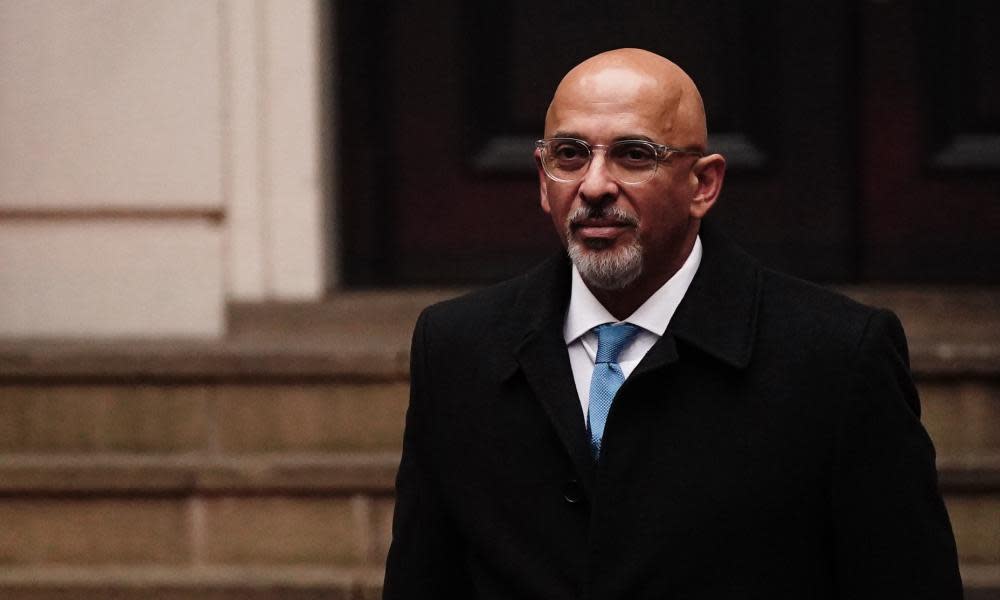Nadhim Zahawi: the extraordinary rise and fall of ‘the boy from Baghdad’

As the MP for Stratford-upon-Avon, Nadhim Zahawi boasts proudly of representing the birthplace of William Shakespeare. His own political downfall has all the makings of a tragedy in five acts.
The Kurdish-born Iraqi refugee, who arrived in Britain aged 11, was sacked as chair of the Conservative party on Sunday after he was found to have committed a “serious breach’” of the ministerial code over his tax affairs.
His dismissal follows days of mounting pressure after the Guardian revealed that the former chancellor had agreed to pay a penalty to HMRC as part of a multimillion pound settlement last year.
He was sacked by Rishi Sunak after an investigation found that he had failed to declare this investigation by HMRC when he was appointed chancellor last July. The prime minister’s ethics adviser found that he had breached the ministerial code again when he failed to declare the tax penalty when appointed to the governments of Liz Truss and Sunak.
It caps an extraordinary downfall for a man who less than a year ago ran to be Conservative party leader and, with it, prime minister of the UK.
Zahawi is, by some measures, one of the most remarkable politicians of his generation. Born in Iraqi Kurdistan, he came to England in 1978 when his family fled Saddam Hussein’s regime. The “boy from Baghdad,” as Zahawi calls himself, initially struggled to settle in his new country and his parents were warned he may suffer from learning difficulties due to his initial inability to speak English.
He overcame those difficulties and entered local politics, serving for 12 years as a borough councillor in Wandsworth, south-west London. At this time, in the late 1990s, he worked for the Conservative MP Jeffrey Archer (who referred to Zahawi as “lemon kurd”).
Zahawi advised Archer during his London mayoral bid in 1999, a campaign that ended in scandal. Two years later, Archer was jailed for four years having been convicted of perjury and perverting the course of justice.
In 2000, Zahawi co-founded the polling company YouGov with his fellow Conservative, Stephan Shakespeare. It floated on the stock market five years later.
The row surrounding Zahawi centred on a tax bill over the sale of shares in YouGov – worth an estimated £27m – which were held by Balshore Investments, a company registered offshore in Gibraltar and linked to Zahawi’s family.
After becoming an MP in 2010, he joined government as an education minister under Theresa May in July 2018, but it was under her successor, Boris Johnson, that his stock rose to new heights.
He oversaw the rollout of Covid vaccines as a health minister between 2020 and 2021 before being appointed education secretary in September that year, charged with clearing up the mess left by Gavin Williamson.
The 55-year-old has for years faced questions over his links to offshore investment firms and whether they were appropriately declared.bHe responded by threatening to sue journalists and tax lawyers as recently as last summer, when he was chancellor, insisting that he had paid “all due taxes” on his multimillion pound fortune.
The HMRC investigation into Zahawi began in April 2021, when he was a business minister. Tax investigators held a face-to-face meeting with the minister two months later, but Zahawi failed to declare it and claimed he did not realise it was a formal investigation.
In July 2022, in the dying days of the Johnson administration, he was appointed chancellor of the exchequer – a role that put him in charge of the UK’s tax policy. Despite the glaring conflict in his new role, Zahawi failed to declare the ongoing HMRC investigation and instead went on the attack, describing reports of the investigation “inaccurate, unfair and clearly smears”.
Zahawi was chancellor for only two months, from 5 July to 6 September 2022, but it was during this time that he arranged a settlement of nearly £5m with HMRC. The Guardian understands this settlement is made up of a £3.7m in tax due, plus a 30% penalty, taking the total to £4.8m. Again, he did not declare this payout until 16 January after further questions.
At the same time Zahawi was resolving his tax affairs with HMRC, he was running for leader of the Tory party with a pledge to slash taxes if he became prime minister. He was knocked out of the leadership race after the first round.
He was appointed chair of the party last October, with sources telling the Observer that Sunak was warned by senior officials that the government faced a reputational risk over Zahawi’s tax matters.
The prime minister sacked Zahawi on Sunday, three months after appointing him.
In a letter to Sunak after his dismissal, Zahawi said it had been “the privilege of my life” to serve in the government.
He added: “I arrived in this country fleeing persecution and speaking no English. Here, I built a successful business and served in some of the highest offices in government. I believe that in no other country on earth would my story be possible. It reaffirms my belief in the greatness and compassion of our nation.”
Zahawi’s memoirs, titled A Boy from Baghdad: My Journey from Waziriyah to Westminster, are due to be released later this year. He now has time to write the latest act of his own political tragedy.

 Yahoo News
Yahoo News 
